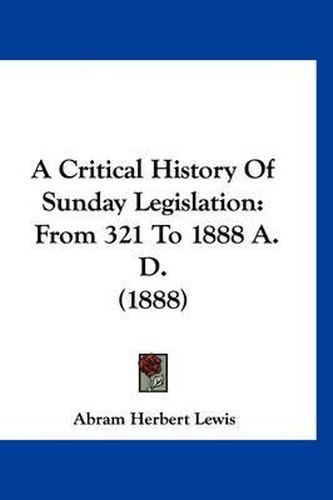Readings Newsletter
Become a Readings Member to make your shopping experience even easier.
Sign in or sign up for free!
You’re not far away from qualifying for FREE standard shipping within Australia
You’ve qualified for FREE standard shipping within Australia
The cart is loading…






Purchase of this book includes free trial access to www.million-books.com where you can read more than a million books for free. This is an OCR edition with typos. Excerpt from book: CHAPTER III. SUNDAY LEGISLATION AFTER THE FALL OF THE ROMAN EMPIRE. In the Roman Sunday laws given.in the last chapter, we have a picture of the united Church and State, and the status of the Sunday and other festivals when the Roman Empire was broken in pieces by the tide of barbarian immigration. It will be well to note the general state of Christianity before taking up the legislation of the next period. Christianity has gained a political victory, and suffered a moral and spiritual defeat. It has imparted much of good to heathenism, but it has suffered far greater loss in its own purity. Worse than all else, it has become involved in a false policy, the ripened fruitage of which can not be less than the horrors of the
dark ages. The controlling ideas in the Church are far removed from the teachings of him who said,
My kingdom is not of this world. Beginning with Constantine, emperors unlearned in the Scriptures and unguided by the spirit of truth, were accustomed to decide whatChristianity was, and what should be persecuted as heresy. Swayed by personal ends and political intrigue, the orthodoxy of to-day was the heresy of tomorrow. Nothing less than a divine Christianity could have survived total destruction. The evidences of perversion and corruption are so great that no lover of truth can close his eyes against the need of reform which yet cries against the false theories that remain in the reforming but not wholly reformed Christianity of our own time. Under the policy of that time, whoever accepted the legal standard was a Christian, whoever did not was a
heretic ?religiously a criminal. Note the following testimony: The martyrs and confessors of the first three centuries in their expectation of the impending end of the world and their desire for the s…
$9.00 standard shipping within Australia
FREE standard shipping within Australia for orders over $100.00
Express & International shipping calculated at checkout
Purchase of this book includes free trial access to www.million-books.com where you can read more than a million books for free. This is an OCR edition with typos. Excerpt from book: CHAPTER III. SUNDAY LEGISLATION AFTER THE FALL OF THE ROMAN EMPIRE. In the Roman Sunday laws given.in the last chapter, we have a picture of the united Church and State, and the status of the Sunday and other festivals when the Roman Empire was broken in pieces by the tide of barbarian immigration. It will be well to note the general state of Christianity before taking up the legislation of the next period. Christianity has gained a political victory, and suffered a moral and spiritual defeat. It has imparted much of good to heathenism, but it has suffered far greater loss in its own purity. Worse than all else, it has become involved in a false policy, the ripened fruitage of which can not be less than the horrors of the
dark ages. The controlling ideas in the Church are far removed from the teachings of him who said,
My kingdom is not of this world. Beginning with Constantine, emperors unlearned in the Scriptures and unguided by the spirit of truth, were accustomed to decide whatChristianity was, and what should be persecuted as heresy. Swayed by personal ends and political intrigue, the orthodoxy of to-day was the heresy of tomorrow. Nothing less than a divine Christianity could have survived total destruction. The evidences of perversion and corruption are so great that no lover of truth can close his eyes against the need of reform which yet cries against the false theories that remain in the reforming but not wholly reformed Christianity of our own time. Under the policy of that time, whoever accepted the legal standard was a Christian, whoever did not was a
heretic ?religiously a criminal. Note the following testimony: The martyrs and confessors of the first three centuries in their expectation of the impending end of the world and their desire for the s…